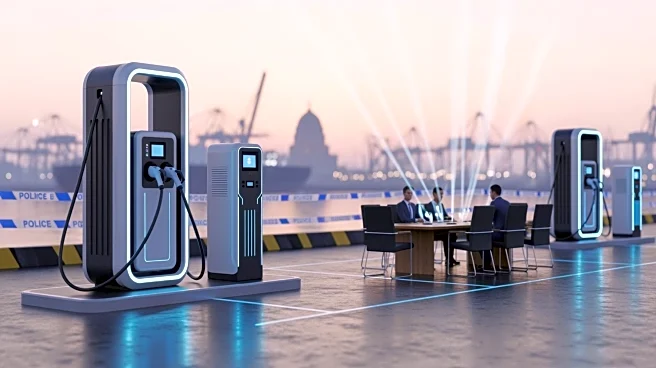What's Happening?
Maersk, a leading container shipping line, and CATL, the world's largest battery maker, have announced a strategic partnership aimed at decarbonizing logistics, port operations, and supply chains. This
collaboration involves electrifying port equipment and deploying advanced battery systems to transform ports into energy nodes. The partnership follows a previous agreement between CATL and Maersk's terminal subsidiary, APM Terminals, to electrify port equipment. The initiative seeks to address the energy transition in shipping by using battery systems to manage energy loads at ports, thereby reducing emissions and improving efficiency. The partnership aims to integrate battery technology across the logistics chain, from forklifts to deep-sea container ships, enhancing the maritime industry's shift towards sustainable practices.
Why It's Important?
The partnership between Maersk and CATL is significant as it represents a major step in the maritime industry's efforts to reduce carbon emissions. Shipping has traditionally relied on bunker fuel, contributing significantly to global emissions. By integrating battery systems at ports, the partnership aims to create a more sustainable energy ecosystem, reducing reliance on fossil fuels and improving air quality in port cities. This move is expected to set a precedent for other sectors within the logistics and transportation industries, encouraging broader adoption of clean energy solutions. The collaboration also highlights the importance of integrating renewable energy sources and battery technology to achieve long-term climate targets and local air-quality standards.
What's Next?
The partnership is expected to focus initially on ports with access to renewable electricity, particularly in Northern Europe, where wind-heavy grids are prevalent. As the model proves successful, it could expand to Asia and North America, potentially extending inland to logistics hubs and warehouses. The initiative aims to replicate successful electrification models across various locations, reducing perceived risks and encouraging large-scale adoption. The collaboration also emphasizes the importance of circularity, with CATL's recycling capabilities allowing for the reuse of battery materials, further lowering costs and supporting sustainable practices.
Beyond the Headlines
This partnership not only addresses immediate environmental concerns but also represents a shift in the maritime industry's identity. Maersk's transition from a shipping company to an energy integrator and CATL's global showcase of its products across diverse environments highlight the evolving role of ports as central hubs in the clean energy system. The initiative underscores the potential for ports to become self-sustaining energy centers, reducing dependency on new imports and fostering a more integrated approach to energy management.








